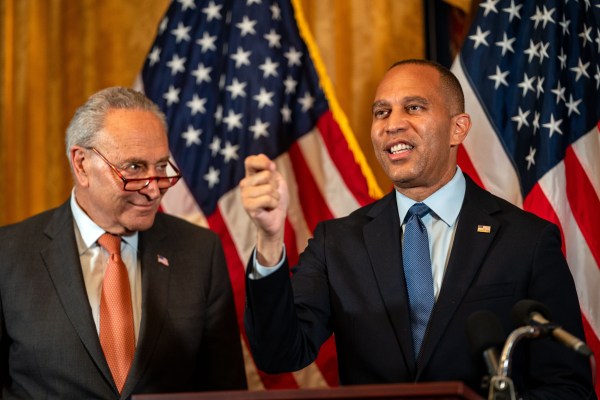Only a fool would try to predict policy at a moment like this, when one presidential candidate is running on “vibes” and the other is, well, certifiable. But some predictions are so easy that they’re impossible to resist. When you have a clear lane to the hoop, you dunk.
So here it is, in four words: free Ozempic for all.
It’s the perfect pander. Americans are chubby, love “free” stuff, and stopped caring long ago about limited government. If you can bribe them to vote for you by promising free access to a miracle drug that will give them the bodies they’ve always wanted without demanding the discipline of dieting and exercise, you don’t think twice.
You dunk.
Given the trajectory of this campaign, whether Donald Trump or Kamala Harris will be the first to propose taxpayer-funded skinny pills is less certain than that one of them will. Both have abandoned former ideological commitments in favor of more popular positions aimed at winning swing voters. As they pander their way to a harmonic convergence on policy, launching hugely expensive bidding wars for important constituencies, it’s inevitable that one or the other will stumble into a pledge to make America thin and hot—with no cost to anyone, magically.
How far the two might potentially sink as they compete to out-pander the other was on my mind as I watched Trump sell out conservatives not once but twice in a single interview on Thursday. First, he was asked by NBC News how he’ll vote on Florida’s upcoming ballot initiative, which would have the practical effect of making abortion legal during all nine months of pregnancy if it passes:
There’s no way to square Florida’s current six-week ban with Trump’s belief that “we need more than six weeks.” A spokesman for Gov. Ron DeSantis, who signed that ban into law, felt obliged to respond in a statement by reminding Trump that overturning the ban would lead to a number of outcomes he’s—supposedly—against. Only after a day of pressure from pro-life supporters did the candidate finally relent and declare—on a Friday evening before a three-day weekend—that he’d vote no on the initiative.
His disdain for six-week bans is old news, though. The real news on Thursday came in this exchange:
Free IVF treatments for everyone, paid for either by Uncle Sam or by private insurers under orders from Uncle Sam. Forget the harmonic convergence on policy, Philip Klein noted at National Review: Trump is now to the left of some prominent Democrats on this issue.
Government-financed IVF treatment, which costs tens of thousands of dollars, would impose an enormous cost on taxpayers, or, as a mandated benefit, would dramatically drive up insurance premiums. Outside of requirements to sell insurance to older and sicker patients and capping the cost to them, IVF is one of the most expensive benefits one can mandate. By taking this position, Trump is calling for hiking premiums on every American who does not use IVF. Had Democrats tried to mandate IVF federally when Obamacare was being debated, it’s quite possible that would have been the breaking point for the more moderate Democrats, and it would have tanked the whole bill. Put another way, Trump has taken a position that was deemed too left-wing for Barack Obama.
After years of apocalyptic Tea Party rhetoric about government power over health care, the head of the GOP is endorsing … insurance mandates, and not for any principled reason. He’s afraid that abortion politics will cost him the election and is desperate to reassure voters about the IVF component of that debate, at least.
So he’s bribing them, lavishly and blatantly, without even a pretense of caring that he’s starkly undermined the traditional Republican position. Democrats now have invaluable political cover from the head of the GOP to push harder for mandatory benefits of all sorts in insurance coverage.
What’s left for conservatives in a party whose leadership is increasingly pro-choice and pro-Obamacare?
He fights?
I considered that question in March, during a Republican primary in which Trump was already in flight from the pro-life movement.
But there was reason to believe at the time that he might eventually tap the brakes on his leftward shift. After all, his opponent in the general election was feeble, unpopular, and had trailed him every day in the national polling average since last September. Trump didn’t need to go all-out in pandering to the center to defeat an incumbent as weak as Joe Biden.
That was then.
His new opponent is polling higher than Biden and now leads in the national average. She’s also proven surprisingly shameless about pandering in her own right, even on Trump’s pet issue of immigration and notwithstanding the hard-left positions she took in the Democratic presidential primary in 2019. Kamala Harris’ unexpected political strength has put heavy pressure on her opponent to keep pace with her in wooing undecided centrist voters. And so, suddenly, he’s no longer tapping the brakes. He’s stepping on the gas.
With the Republican moving left and the Democrat moving right, are we sure our friend David French is wrong in believing there’s a conservative case for Harris, if only as the least bad choice among two very unconservative options?
Consider the proverbial three-legged stool of Reaganism.
The first leg is fiscal conservatism, which should be an easy advantage for Republicans. Not anymore: Trump’s desire to slash taxes on everything from income to Social Security to corporate revenue without commensurate spending cuts will create a deficit over the next 10 years that’s nearly five times higher than the deficit in Harris’ agenda.
He’s crazy about tariffs, he won’t touch entitlements, and he wants to set monetary policy to suit his political interests. There’s nothing meaningfully fiscally responsible about this guy, in case his taxpayer-funded IVF scam—or the gigantic deficits he ran during his first term—didn’t make that clear enough.
The second leg of the stool is hawkishness on national defense. To make the case for Trump over Harris here, you need to emphasize Israel to the exclusion of practically everything else. It’s true that his party supports the Jewish state more solidly than Harris’ does, although she’s sounded more Republican than progressive in her comments about Israel lately. But it’s also true that Harris’ party is now more willing to enforce the Pax Americana globally than Trump’s is.
On the question of who’s more likely to defend NATO and contain Russia by supporting Ukraine, there’s no contest. With respect to China, an evergreen rhetorical foil for Trump, there’s reason to believe Harris is more willing to come to the aid of an American ally like Taiwan than he is. Presumably, Trump would be tougher on Iran than modern Democrats like Harris have been, but he’s chattered lately about “friendly” relations with Tehran and the Biden White House has been willing to flex some naval muscle to restrain the mullahs from all-out war with Israel.
Ask yourself this: Having lived through the last eight years, which of our two candidates do you believe is more likely to invite Ayatollah Khamenei to a big back-slapping summit? Kamala Harris or a guy who continues to burble to this day about the love letters he received from Kim Jong Un?
The last leg of the stool is social conservatism. For all the hype about the culture war, Trump isn’t above capitulating in skirmishes and spends precious little time on the stump proposing DeSantis-style policy initiatives to advance a cultural agenda. The biggest right-wing cultural defeat of the last 20 years is the legalization and acceptance of gay marriage, and neither man on the Republican ticket has much to say about it, let alone about reversing it.
On abortion, even an increasingly pro-choice Trump is preferable to a liberal like Harris, who’s keen to reinstate the Roe regime via federal statute. But abortion in the post-Roe era is tricky for pro-lifers: If there isn’t enough public support to pass national restrictions (and there isn’t), then reducing the number of terminations is more a matter of persuasion than legislation. And it’s by no means clear that President Trump would be more useful in that persuasion effort than President Harris would.
Harris is a traditional Democrat saying traditionally Democratic things about abortion. She isn’t changing anyone’s mind on either side. Trump, on the other hand, is at this very moment creating a permission structure for right-wingers to treat abortion as a minor priority by bartering away pro-life positions in exchange (he hopes) for votes.
This is what David French, a staunch pro-lifer, worries about in making his case for Reaganites to support Harris. If conservatives insist on sticking with Trump as he moves further and further left on abortion, they’re inescapably validating the current national consensus that killing life in the womb is acceptable and should be lawful. The debate going forward will simply be over how generous state laws should be in legalizing terminations.
To force Republicans back toward the pro-life position, Trump has to pay an electoral price for his betrayal.
All in all, under the immense weight of Trumpism, each of the three legs of the Reaganite stool is breaking. Economist (and Dispatch contributor) Brian Riedl wondered on Thursday after the NBC News interview aired: “If a Democrat sought to destroy the GOP by creating a cult of personality, sabotaging other GOP lawmakers & candidates, making a mockery of its morality and character claims, all while undoing every conservative policy principle … would he have done anything different than Trump?”
Would he?
Trump’s apologists are forever insisting that “he fights!” but stop and think for a moment: What is he actually fighting for at this point? His right to hawk digital trading cards?
Conservatism as a rump movement.
I suppose the response to Riedl is that a Democratic imposter wouldn’t have endorsed a plan to deport millions of illegal immigrants.
Although … maybe he would have? Mass deportation will almost certainly fail as a project; when it does, even that element of Trumpism will be discredited as infeasible.
Trump’s not a Democratic imposter, though. He’s a nationalist. He’s never made (much of) a pretense of being a conservative. Nationalists prioritize a generous welfare state, strong measures to exclude foreigners, a much lighter military footprint abroad, and better relations with illiberal regimes. They fight the enemies within, not without. In hindsight, it was inevitable that the GOP’s agenda under Trump’s leadership would gradually elevate those priorities while sidelining traditional Republican concerns like the sanctity of life.
The remaking of the GOP as a nationalist project necessarily required its unmaking as a conservative one. So what are conservatives still doing in this party?
One answer to that is—they aren’t. Many Reaganites have drifted out of the Republican orbit over the last nine years. As I was writing this very piece, news broke that Liz Cheney is likely to endorse Kamala Harris next month. Millions of former Republicans who’ve left the party since 2016 will vote Democratic this fall in the name of stopping Trump. Dispatch conservatives: They’re real, and they’re spectacular.
But many have stuck with the GOP and will continue to do so, even as Trump proceeds with his project to turn it into some sort of National-Front-style European party. And they’ll rationalize doing so in a number of ways.
“Trump’s centrist pandering is all rhetoric. Once he’s reelected, he’ll govern as a conservative.”
One can’t rule out this possibility, I suppose, any more than one can rule out Harris doing the same thing in reverse if she wins. Trump is wildly erratic on a good day, will be term-limited as president, and suffers from authoritarian instincts that make it unlikely that he’ll show restraint. If a Republican Congress sends him a bill restricting abortion nationally, can you imagine him declining to sign it out of deference to states’ rights? Has he ever shown deference to anyone, about anything?
Plus, he’s a pathological liar. Why wouldn’t he lie about his intentions on abortion too?
He really might turn around after all of this moderate posturing and govern as the iron-fist abortion-banner of the pro-life movement’s dreams. (That’s certainly what the Harris people want voters to believe about his comments to NBC News.) But for what it’s worth, Lila Rose of the anti-abortion group Live Action says she’s spoken to his campaign and hasn’t received any reassurances that he’s being insincere. On Thursday, she declared that “we have two pro-abortion tickets this year” and hinted heavily that she won’t support Trump this fall unless he changes course, a rare show of spine for a pro-life leader. There’s no good reason to believe he’s lying.
“Trump will lose. And once he’s gone, the GOP will return to its conservative roots.”
Is that right? An entire generation of young Republicans has been weaned on Trumpism, not conservatism. Why would they suddenly prioritize fighting abortion after their hero taught them to prioritize fighting immigration and “globalists” instead?
Unmaking nationalism as the party’s guiding ideology will be even harder if Trumpist control of the GOP persists, as is likely. Trump will presumably continue as leader even if he loses a second time, thanks to the next round of idiotic “rigged election” propaganda immunizing him from accountability for his defeat. And after he dies or retires, a talented demagogue in the mold of Donald Trump Jr., Tucker Carlson, or Matt Gaetz would be more simpatico temperamentally with the new Republican base than a sober traditional conservative like Brian Kemp.
In fact, apart from Kemp and possibly DeSantis, there’s hardly any conservative political talent left in the post-Trump GOP that seems capable of overcoming MAGA’s “uniparty” hostility. (Right, Nikki?) Two days ago, I conceded that most Republican voters are malleable enough on ideology that they might revert to Reaganism if a charismatic leader came along and captured their imaginations. But who is that leader? The party could be pro-life again; who’s going to convince them to do it?
Pro-life leaders? Please. Apart from Rose, they’ve rolled over.
If Trump loses, pro-lifers will argue that his defeat was due to him moving too far to the left on abortion, depressing his base—and they might be right. But it’ll be trivially easy for nationalists to argue the opposite, that Trump didn’t move far enough to the left to defeat the potent ongoing pro-choice backlash to the end of Roe at the polls. If the new nationalist Republican Party wants to truly neutralize this issue, they’ll say, it’ll need to make even more concessions. The sacred goal of defeating the “deep state” requires nothing less.
“Yes, the GOP is increasingly left-ish, but it’s still better than the Democratic Party.”
Ultimately, this is the rationalization that will convince most traditional conservatives to stick with the party.
And why wouldn’t it? It’s the credo of anti-anti-Trumpism, the same rationalization that’s convinced them to stick with the party until now. For nine years, small-government right-wingers have coped with their declining influence within the Republican Party by making themselves useful to their new nationalist masters. They’ve attacked Democrats incessantly, punctuated by sporadic pro forma reminders that they don’t personally support Trump. In doing so, they’ve filled the same sort of niche that progressives occupy on the left, a rump ideological cohort that believes both parties are bad but that the other one remains, in important ways, meaningfully worse.
Frankly, that might be unfair to progressives: They devote much—much—more of their time holding the Democratic leadership accountable than anti-anti-Trump conservatives do vis-a-vis Trump.
Democrats’ own extremism on abortion in pressing for federal statutory rights and opposing practically all restrictions will supply plenty of reason for anti-anti-Trumpers to justify remaining with the GOP as the three-legged stool collapses beneath them. In fact, I wonder if abortion will ironically begin to take on outsized importance for the conservative rump as the differences on the issue between the two parties vanish. If it’s a high priority for you to remain part of the right’s partisan tribe, and if Trump’s nationalist agenda is offering you zero reason to do so, even small disagreements with Democrats over the high moral stakes of abortion might be enough of a fig leaf to rationalize remaining within the Republican tent.
By 2032, many Republican partisans will insist that the fate of the country rests on electing an authoritarian who supports a 20-week abortion ban over a liberal who supports one after 23 weeks. Thanks to Trump and their own spinelessness, that’s probably the future of conservatism.







Please note that we at The Dispatch hold ourselves, our work, and our commenters to a higher standard than other places on the internet. We welcome comments that foster genuine debate or discussion—including comments critical of us or our work—but responses that include ad hominem attacks on fellow Dispatch members or are intended to stoke fear and anger may be moderated.
With your membership, you only have the ability to comment on The Morning Dispatch articles. Consider upgrading to join the conversation everywhere.